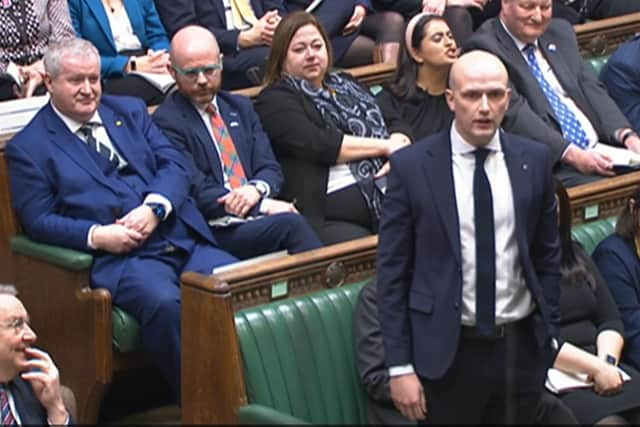Scottish independence: SNP may be delighted by recent polls, but unionists have reasons to be hopeful – John McLellan
No doubt further energised by England’s World Cup exit the night before, but who’d blame them for wanting to capitalise on their advances? With support for independence having stubbornly refused to breach the 50 per cent mark for over a year, with a Panelbase poll on October 10 putting No on 52, it has suddenly surged into the lead. After the Supreme Court ruled the Scottish Government had no power to hold a referendum on November 23, three successive polls put Yes ahead on 52, 56 and, at the end of last week, on 54, once don’t knows are removed.
If the key to political success is the constant repetition and communication of very simple messages, then these results suggest the “democracy deniers” line remorselessly peddled by the SNP ever since the Supreme Court decision has done the trick. As the outcome was widely expected, apparently not least by the Lord Advocate Dorothy Bain, it will have been prepared for and, rather than a supposedly disappointing outcome, the adverse ruling was the whole purpose of the exercise, a necessary process to obtain the solid evidence needed for new grounds to prosecute Scotland’s departure from the UK.
Advertisement
Hide AdAdvertisement
Hide AdThat being the plan, I can imagine the horror amongst Nicola Sturgeon’s inner circle that the carefully prepared groundwork was about to be churned up by a rebellion amongst SNP MPs to dump her Westminster leader Ian Blackford; coup leader Stephen Flynn had to be persuaded to back off and give the party space to land its key post-Supreme Court messages. It was only a stay of execution, despite what appears to be initial success for this part of the leadership’s strategy, so no wonder Sturgeon-ally Pete Wishart made his dismay known in the wake of Mr Blackford’s resignation. "I remain bemused as to the reasons why you felt it was necessary to seek a change in our leadership, particularly when we see yesterday's opinion poll, which shows support for independence at a near all-time high and support for the SNP at Westminster at an unprecedented 51 per cent," he wrote.


Much has been written about the challenge to Ms Sturgeon’s authority and supposed crumbling of SNP discipline which strangles dissent, but if the momentum of the past fortnight is sustained it would be foolish to presume normal service will not be resumed. However there are so many moving parts in a political landscape more volatile than at any time since the early 80s that trying to make any predictions about the SNP’s fortunes with the young guns in charge in London is virtually impossible.
Mr Blackford has been regularly criticised for becoming too comfortable in Westminster and, if reports are to be believed, Stephen Flynn and his deputy Mhairi Black are planning a much more combative and disruptive approach to Commons business. Whether that involves more mace-pinching, for which their new foreign affairs spokesman Drew Hendy was suspended in 2020, remains to be seen, but while stunt-based headline-grabbing might go down well with a certain sort of nationalist, the appeal to the floating voters who will determine the success of the SNP’s tactics may be limited.
Perhaps this is being exaggerated, because someone who is canny enough to become Westminster leader of a big group after only three years as an MP will surely recognise that being seen as the cause of making the Commons unworkable, rather than let its actions speak for themselves, is a high-risk strategy. I can only presume a smart political operator will grasp that petty political gimmickry is not the best advert for a party intent on governing a new independent state.
They must also calculate who benefits most from disruption. There is more than enough disruption just now to last several lifetimes and while the polling evidence shows the SNP is escaping blame, Labour is gaining across the UK and guerrilla stunts could easily make the SNP group look like ill-considered opportunists compared to a maturing Labour front bench. SNP MPs are said to be concerned about the wisdom of Ms Sturgeon betting everything on their general election performance, but that’s the game she’s chosen to play and with the difference between success and failure now a knife-edge, gambling even more aggression will persuade moderate voters might be one punt too many.
There have been big poll leads before, most recently in October 2020 as the second lockdown began to bite when support reached 59, so the latest lead is by no means solid. The next big test is Thursday’s Scottish budget with Social Justice Secretary Shona Robison saying that higher taxes on around 500,000 already squeezed middle earners are expected to cover public sector wage demands ─ STUC general secretary Roz Foyer has promised “war” if they’re not met ─ while maintaining big giveaways and higher welfare. Stand-in Finance Secretary John Swinney will blame the UK Government, but after last year’s £2bn underspend and a litany of waste ─ and the Fraser of Allander Institute confirming an extra £1.5bn from the Treasury will offset inflation ─ how long will the public keep buying the excuses?
This is a big week for the UK economy too, with the November inflation figures out tomorrow and the Bank of England’s interest rate announcement on Thursday. Most analysts believe inflation has peaked and will slow, and the monetary policy committee will limit the rate hike to 0.5 per cent, still painful but at least showing glimmers of light at the end of the tunnel. With economic stability more likely, but aspirational Scots hammered harder, and the First Minister’s authority being questioned as never before, no wonder the SNP activists were out on a Sunday morning.
Comments
Want to join the conversation? Please or to comment on this article.
